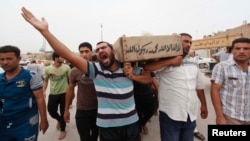Iraq's Shi'ite Prime Minister Nuri al-Maliki has ordered a shakeup of senior government security officers, as a weeks-long wave of violence grips the country and fears of all-out sectarian war spread.
The shakeup was confirmed on the prime minister's website, but details were not immediately clear. The move comes as authorities reported at least 21 deaths Tuesday in attacks that include a car bombing at a Sunni mosque that killed at least eight people and wounded about 20 others. Earlier Tuesday, at least 12 people were killed in attacks in three Iraqi cities.
Dozens of mosques have been bombed so far this year, including two Shi'ite places of worship south of Baghdad, where more than a dozen people died on Monday.
Iraq is experiencing its worst sectarian violence since U.S. troops withdrew from the country in late 2011.
More than 200 people have been killed in the past week, including 70 who died Friday in a series of bombings targeting Sunnis.
In Washington, White House spokesman Jay Carney condemned all the recent attacks, saying U.S. officials have been in contact with "a wide range of Iraqi leaders ... to help resolve ongoing political and sectarian tensions."
The unrest has raised fears of a return to the level of sectarian fighting that left tens of thousands dead in 2006 and 2007.
Violence has fallen from that peak, but the United Nations said 712 people were killed in April, making it the deadliest month in Iraq since June 2008.
Some information for this report was provided by AP, AFP and Reuters.
The shakeup was confirmed on the prime minister's website, but details were not immediately clear. The move comes as authorities reported at least 21 deaths Tuesday in attacks that include a car bombing at a Sunni mosque that killed at least eight people and wounded about 20 others. Earlier Tuesday, at least 12 people were killed in attacks in three Iraqi cities.
Dozens of mosques have been bombed so far this year, including two Shi'ite places of worship south of Baghdad, where more than a dozen people died on Monday.
Iraq is experiencing its worst sectarian violence since U.S. troops withdrew from the country in late 2011.
More than 200 people have been killed in the past week, including 70 who died Friday in a series of bombings targeting Sunnis.
In Washington, White House spokesman Jay Carney condemned all the recent attacks, saying U.S. officials have been in contact with "a wide range of Iraqi leaders ... to help resolve ongoing political and sectarian tensions."
The unrest has raised fears of a return to the level of sectarian fighting that left tens of thousands dead in 2006 and 2007.
Violence has fallen from that peak, but the United Nations said 712 people were killed in April, making it the deadliest month in Iraq since June 2008.
Some information for this report was provided by AP, AFP and Reuters.













